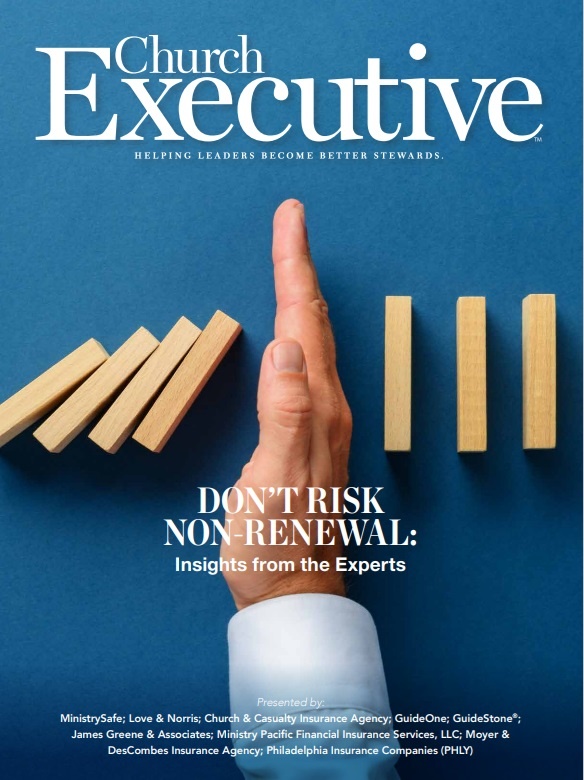 A better question is: Why were churches blindsided by one of the most severe hard-market cycles in recent memory? It was this downturn that led to non-renewals and higher rates.
A better question is: Why were churches blindsided by one of the most severe hard-market cycles in recent memory? It was this downturn that led to non-renewals and higher rates.
Maybe the answer lies in churches’ DNA.

Founder / Managing Member
Ministry Pacific Financial Insurance Services, LLC
Most churches don’t think of themselves as businesses or entities susceptible to market cycles. By and large, they don’t like change. For these reasons, many churches have continued to secure their coverage with the same insurance company for over the past decade.
When churches do secure quotes from other carriers, these insurance companies usually response with a price match — which might seem beneficial but rarely addresses the issue of underwriting integrity, coverage analysis, whether or not buildings are undervalued, or the carrier’s financial stability.
The A.M. Best rating of a carrier is important. It details its financial health, financial obligations, and ability to satisfy claims and debt.
Having this information will allow your leadership to anticipate whether their carrier will be tightening its underwriting standards, increasing rates, or non-renewing accounts that are underperforming.
Case in point: there still remain insurance companies underwriting churches today have recently been recently downgraded by A.M. Best with negative outlooks and concerns about their reserves and surpluses. These carriers will have to increase rates, employ stricter underwriting guidelines, and non-renew less profitable accounts.
Insurance: a necessary evil?
The answer depends on perspective. Insurance is a financial planning tool that protects your financial path forward from unexpected events that can render your operations insolvent. It’s also a complex product written by attorneys and based on actuarial science, statistics and financial models. These disciplines work together to secure an outcome where claims are paid and insurers remain financially strong.
Key to these calculations is your church adhering to regulations and underwriting guidelines, protecting its assets, and ensuring the well-being of those in their care.
Standards to use when purchasing insurance
Insurance salespeople are meant to be field underwriters who make the initial decision about a potential client’s ability to meet carrier underwriting requirements and to verify policies and procedures are in place to protect church assets and the well-being of employees, volunteers, youth and members. Instead, there remains a natural conflict, given these individuals are incentivized by increasing their commission income and meeting sales quotas.
As an incentive, insurance is modeled on an experience modification system that has a multiplier effect on premiums, which acts as an incentive for implementing loss prevention.
Why churches are non-renewed

Reasons include too many claims, lack of property maintenance, and failure to comply with regulations. Other factors include late payments, noncompliance with underwriting guidelines, elevated risk exposures, and misrepresentation of material facts (which can also lead to a claim being denied).
The characteristics of a hard market
A hard market is characterized by increased premiums, stricter underwriting capacity, higher property deductibles, policy cancellation and nonrenewal — everything happening right now.
When does this hard market end? The answer might reside in the current financial health of your carrier. Market cycles ebb and flow; if your carrier is downgraded by A.M. Best with a negative outlook and inadequate claim reserves, they might well exit this cycle much later than healthy carriers.
It’s important to remember that this cycle has been in effect for six years due to unusually catastrophic weather-related losses, economic downturn, regulatory changes, stubborn inflation, and increasing reinsurance rates.
Should churches buy from a broker?
A commercial insurance broker is an intermediary who represents the buyer and ensures comprehensive, reliable information is submitted to the carrier on behalf of the client. Brokers perform an unbiased comparative analysis of carrier proposals and determine which provides the most comprehensive coverage at a competitive price.
They also verify the financial health of the carrier, which directly correlates to their claims paying ability, long-term reliability, and rate stabilization.
Adding to this situation, buildings built in the 1960s, 1970s and early 1980s are approaching the end of their lives. Carriers know that building reconstruction will be expensive, especially factoring in 21st-century building codes.
On the liability side, social inflation is a driver of increasing premiums. This is due to rising costs of insurance claims, increasing litigation, broader definitions of liability, and larger compensatory jury awards.
How churches can adapt to the aftermath of this market cycle
It will be challenging, but it also creates an opportunity for churches to implement new business models that focus on developing their assets — people, technology, facilities and branding — which can lead to enhanced social benefits for their communities and their revenue base.
Churches should consider seeking counsel from independent experts who can help their leadership successfully implement policies, procedures, and business plans that increase their leverage as insurance consumers. A good start is contacting Gregory Love, co-founder and director of MinistrySafe and Max Herr, founder and principal of Church & Ministry Compliance Consulting.
Fritz Hahn is the founder and managing member of Ministry Pacific [www.ministrypacific.com] and has three decades of experience in the insurance industry. Hahn founded Ministry Pacific in 2005 with the goal of providing churches and charitable nonprofits with a strategic approach to insurance markets that maximizes their coverage and purchasing power.


